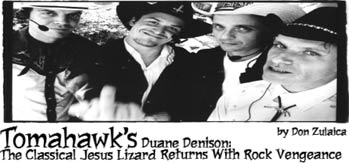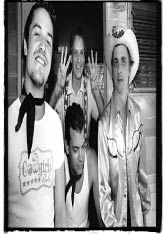
Left to Right: Stanier,
Patton (flipping the bird), Denison, Rutmanis
So,
you've kind of carved a niche for yourself. You've busted
your ass playing guitar for one of the more celebrated
punk bands of the last decade or so—The Jesus Lizard.
You've won all the indie hearts with CD titles like Head,
Goat, Bang and Blue. So Nirvana made
a ton of dough in the '90s; who cares. You put out a 7"
with them anyway.
Your name is Duane Denison. And the indie-minded, swooning,
guitar whack-off magazines don't know what to do with
you. Why? You've also got a degree in classical guitar
from Eastern Michigan University, and you studied with
legends like Manuel Barrueco and Christopher Parkening.
That's like C.C. Deville taking theory lessons with Itzhak
Perlman. (Wait, that may have actually happened.) Okay,
it's like Johnny "Jackass" Knoxville taking
acting lessons from DeNiro.You're a learned man in a blissfully
retarded music world. What is there left to do?
If you're Denison, you might recruit some like-minded
psycho talent—like drummer John Stanier (Helmet),
bassist Kevin Rutmanis (Melvins, Cows) and vocalist Mike
Patton (Mr. Bungle, Faith No More), and unleash Tomahawk
on the unsuspecting public. While not as extreme as Patton's
John Zorn/solo escapades, the album smacks of sinuously
cinematic, indescribable kitchen-sink rock. It's what
happens when guys with small-label freedom, punk attitudes
and big cajones get the opportunity to kick some ass together.
(Ed’s note: Tomahawk was released on Mike
Patton’s label, Ipecac, on Halloween.)
Exotic caught up with Denison relaxing at his Nashville
home, just before kicking off an hellatious Tomahawk club
tour that includes a next-to-the-last-stop, December 2nd,
at the intimate Berbati's Pan—the only small club
on the tour.
"On the one hand I am into
the music, and the music is the main thing.
But on the other hand, I do enjoy my earthly pleasures."
Exotic:
This seems to be a little more of a commercial effort,
 musically.
musically.
Denison: Well, we're not necessarily trying to
make it commercial. I just wanted this to be a rock band,
first and foremost, right from the start. I made that
clear to everyone. The stuff Mike's been doing lately,
Fantomas, Bungle and other side projects, some of which
are fairly extreme; this is a lot more accessible than
that stuff. It's not particularly radio-friendly or easy
listening, by any means. It's not like we consciously
said, "Hey, let's make a commercial record."
There's quite a few songs on it that I guarantee you...well,
I don't think the album will ever get on commercial radio
or MTV. But as far as college radio or independent, or
club play, I think it's just fine.
Exotic: What's the story with meeting Patton? You
saw a Mr. Bungle show in Nashville a couple years back?
Denison: Yeah, exactly. I was playing with Hank
Williams III at the time, and the bass player from the
band was friends with Mike (Patton) and some of the other
band members, because he was from California. So he said,
"Come on, let's go see this band, Mr. Bungle."
I had never listened to them, to be honest. So I went
to the show and thought it was great...it blew me away.
They were wearing the beach shirts; it was after they
released California. I got to meet Mike afterwards
and that's kind of how this whole thing got started.
Exotic: How does this musically differ from the
stuff you did with the Jesus Lizard?
Denison: Well, I wrote the basic structures to
pretty much all the songs on this, and I wrote a lot of
the Jesus Lizard stuff. So you can hear my guitar style
in there, I guess—at least in some of the riffs and
chord structures. There's a lot of atmospherics with Tomahawk,
and cinematic stuff. It's not just a wall-to-wall hard
rock or noise album. There's quite a bit of textural things,
and a bit of electronics and sampling done as well.
Exotic: Was this the music you had in the can?
Denison: I had almost all of the album together
by the time we started working on stuff. I was sending
tapes back and forth to people. And Mike would add a vocal
or electronic stuff and send it back, and then we'd talk
about it. Eventually, one by one, everyone came through
Nashville and just got together for a few days at a time
to work with me—Kevin on bass, John on drums, Mike
singing and doing keyboard stuff.
So then, by the time we all got together to rehearse for
the album, all the songs were pretty much in place. It
was just a question of tweaking the final arrangements
and then making decisions about mixing.
Exotic: What was it like collaborating with John
Stanier and Kevin Rutmanis?
Denison: Kevin and I have a lot in common as far
as musical taste; John has very good opinions, especially
in arrangements—trying to get the most out of a song,
how to get the momentum out of it and really make the
most out of the ideas.
Exotic: Did the music get tweaked a lot in the
studio because of their musical personalities?
Denison: Oh sure, little individual parts. I'm
not a dictator about things. I try to leave a certain
amount of room for people to add their own touch, and
everyone did. Some things were a little bit more linear,
and that didn't require any additional stuff. But I try
to leave a certain amount of leeway. I think it's my job
just to kind of put the ideas in play and then let people
run with it, rather than control every bit of it.
Exotic: Now, you’re seen as having all this
punk and heavy influence, but you got a degree in classical
guitar from Eastern Michigan University?
Denison: Yeah I did. At that time they were one
of the few state universities in the area where you could
have guitar as your major instrument. So I got a scholarship
for a year, and took a couple years off...But yeah, I
did actually finish up and get the degree.
Exotic: And you studied with Christopher Parkening?
I took two quarters of classical guitar in college and
he wrote the fucking textbook.
Denison: I had master classes with him in Montana
in the late '70s. I was good back then. [laughs] And you
know, a master class, you pay money to go up in front
of an auditorium full of people and play; you're not allowed
to warm-up, it's a performance. You get up there and play
in front of the "master." And the audience critiques
you. And then you go back the next day and work on it
and do the same thing again. The first year, I didn't
do so well. I was scolded and humiliated, in front of
an auditorium full of people, for days at a time. I made
it my goal in life to come back and avenge myself, so,
I literally practiced for five hours a day for two years
and came back and did better. And then I quit playing
classical guitar and [laughs] got into punk rock.
Exotic: What intrigued you about punk?
Denison: At first, it was just the novelty of it.
It was energy and aggression, which I had sort of pent
up at the time. But as time went on, it seemed like there
was actually some weird, almost experimental elements
to some of those early groups back then: Public Image,
Magazine was very seminal, The Fall had some oddities,
The Stranglers and Killing Joke had some different things
going on.
There was some stuff that seemed to overlap: King Crimson,
the album Red I thought was very seminal; Roxy
Music, the album For Your Pleasure was very seminal;
the Eno solo albums and the Robert Fripp stuff. All of
that kind of showed to me that you could play rock—it
was still definitely rock, it wasn't jazz, it wasn't fusion,
it wasn't chamber music—but use some artistic or
intellectual elements as well. That kind of stuff really
turned me around.
Exotic: You're hitting Portland on December 2nd;
any weird memories of going through here with Jesus Lizard?
Denison: Well, we used to play that place, the
Satyricon, and that was in a part of town that was sort
of seedy and run down. And Portland being a port city,
it seems like port cities always have lots of junkies.
I remember taking a stroll and...there’s even little
old ladies asking for heroin walking down the street.
I remember playing a show there...I don't remember who
the opening group was...maybe Dead Moon or some other
local band. And the audience just went unhinged during
our set; it was the craziest show. Some girl got onstage
and was dancing, girls in the audience were taking their
tops off. It was like Fellini, Satyricon.
Exotic: I remember talking with Stewart Copeland,
who said, "Growing up, you don't get laid a lot playing
jazz."
Denison: Well, there's a certain element of truth
in that. Any type of music sort of has a social function,
some more than others. Like classical guitar I found to
be just a thankless job. You practice four or five hours
a day for a year, and at the end of the year you might
have 45 minutes worth of material you can perform. You've
done all this practicing, by yourself mostly, and then
you play these quiet little shows. If you're lucky, maybe
you can go play somewhere at a goddamn Italian restaurant
or something.
Meanwhile, people playing rock or improv or jazz, it's
the exact opposite. You practice for 40 minutes and you've
got five hours of music. And there's a built-in social
life. So, on the one hand I am into the music, and the
music is the main thing. But on the other hand, I do
enjoy my earthly pleasures.





